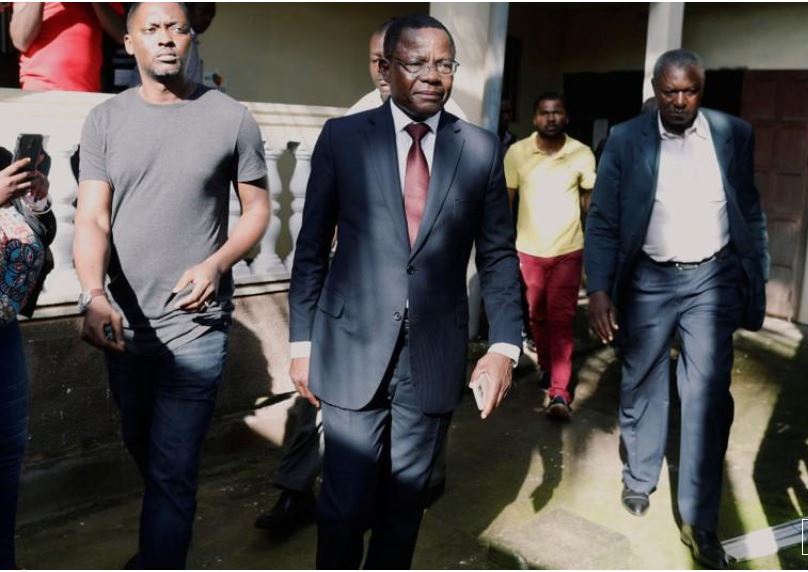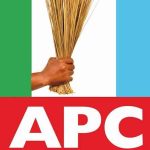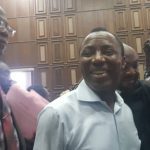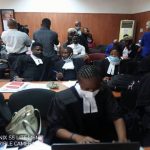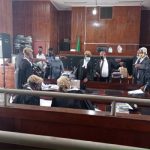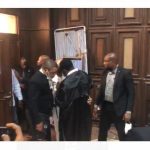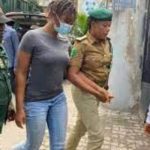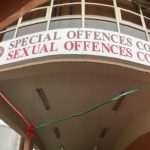Opposition candidates who say last week’s presidential election in Cameroon was marred by fraud had their appeals heard at the country’s Constitutional Council on Tuesday.
President Paul Biya is widely expected to extend his 36-year rule by winning a seventh term, making him one of Africa’s longest serving leaders.
But allegations of voter intimidation, violence and ballot-stuffing have cast doubt over the Oct. 7 election and raised political tensions ahead of results expected before Sunday.
Opposition candidate Maurice Kamto, who declared victory shortly after the vote without providing actual figures, asked the court to cancel results in seven regions of Cameroon.
“This election was absolutely irregular,” Emmanuel Simh, the vice president of Kamto’s Movement for the Rebirth of Cameroon (MRC) party, said in court on Tuesday.
Cameroon’s electoral body Elecam has defended its organisation of the poll and said over the weekend that it had not seen any proof of fraud. Government spokesman Issa Tchiroma Bakary has dismissed allegations of fraud.
Candidates Joshua Osih and Cabral Libii have asked for the results to be cancelled and the election to be re-run.
Civil society groups have called for peaceful demonstrations against the election process, but none have taken place so far.
Opposition to another seven years of Biya rule comes amid a separatist insurgency in the English-speaking South West and North West regions where there were isolated incidents of violence on election day and where few went to vote.
Crisis Group analyst Hans De Marie Heungoup estimated an average voter participation of 55 percent in Francophone regions and five percent in Anglophone areas.
The major cocoa and oil producer has experienced economic growth of over 4 percent a year since Biya was last elected in 2011, but many of its 24 million citizens still live in poverty.
An Islamist Boko Haram insurgency in the north, which spread from neighbouring Nigeria, has killed scores over the past decade. The Anglophone crisis has cost hundreds of lives and forced thousands to flee their homes.
Opposition candidates who say last week’s presidential election in Cameroon was marred by fraud had their appeals heard at the country’s Constitutional Council on Tuesday.
President Paul Biya is widely expected to extend his 36-year rule by winning a seventh term, making him one of Africa’s longest serving leaders.
But allegations of voter intimidation, violence and ballot-stuffing have cast doubt over the Oct. 7 election and raised political tensions ahead of results expected before Sunday.
Opposition candidate Maurice Kamto, who declared victory shortly after the vote without providing actual figures, asked the court to cancel results in seven regions of Cameroon.
“This election was absolutely irregular,” Emmanuel Simh, the vice president of Kamto’s Movement for the Rebirth of Cameroon (MRC) party, said in court on Tuesday.
Cameroon’s electoral body Elecam has defended its organisation of the poll and said over the weekend that it had not seen any proof of fraud. Government spokesman Issa Tchiroma Bakary has dismissed allegations of fraud.
Candidates Joshua Osih and Cabral Libii have asked for the results to be cancelled and the election to be re-run.
Civil society groups have called for peaceful demonstrations against the election process, but none have taken place so far.
Opposition to another seven years of Biya rule comes amid a separatist insurgency in the English-speaking South West and North West regions where there were isolated incidents of violence on election day and where few went to vote.
Crisis Group analyst Hans De Marie Heungoup estimated an average voter participation of 55 percent in Francophone regions and five percent in Anglophone areas.
The major cocoa and oil producer has experienced economic growth of over 4 percent a year since Biya was last elected in 2011, but many of its 24 million citizens still live in poverty.
An Islamist Boko Haram insurgency in the north, which spread from neighbouring Nigeria, has killed scores over the past decade. The Anglophone crisis has cost hundreds of lives and forced thousands to flee their homes.
Opposition candidates who say last week’s presidential election in Cameroon was marred by fraud had their appeals heard at the country’s Constitutional Council on Tuesday.
President Paul Biya is widely expected to extend his 36-year rule by winning a seventh term, making him one of Africa’s longest serving leaders.
But allegations of voter intimidation, violence and ballot-stuffing have cast doubt over the Oct. 7 election and raised political tensions ahead of results expected before Sunday.
Opposition candidate Maurice Kamto, who declared victory shortly after the vote without providing actual figures, asked the court to cancel results in seven regions of Cameroon.
“This election was absolutely irregular,” Emmanuel Simh, the vice president of Kamto’s Movement for the Rebirth of Cameroon (MRC) party, said in court on Tuesday.
Cameroon’s electoral body Elecam has defended its organisation of the poll and said over the weekend that it had not seen any proof of fraud. Government spokesman Issa Tchiroma Bakary has dismissed allegations of fraud.
Candidates Joshua Osih and Cabral Libii have asked for the results to be cancelled and the election to be re-run.
Civil society groups have called for peaceful demonstrations against the election process, but none have taken place so far.
Opposition to another seven years of Biya rule comes amid a separatist insurgency in the English-speaking South West and North West regions where there were isolated incidents of violence on election day and where few went to vote.
Crisis Group analyst Hans De Marie Heungoup estimated an average voter participation of 55 percent in Francophone regions and five percent in Anglophone areas.
The major cocoa and oil producer has experienced economic growth of over 4 percent a year since Biya was last elected in 2011, but many of its 24 million citizens still live in poverty.
An Islamist Boko Haram insurgency in the north, which spread from neighbouring Nigeria, has killed scores over the past decade. The Anglophone crisis has cost hundreds of lives and forced thousands to flee their homes.
Opposition candidates who say last week’s presidential election in Cameroon was marred by fraud had their appeals heard at the country’s Constitutional Council on Tuesday.
President Paul Biya is widely expected to extend his 36-year rule by winning a seventh term, making him one of Africa’s longest serving leaders.
But allegations of voter intimidation, violence and ballot-stuffing have cast doubt over the Oct. 7 election and raised political tensions ahead of results expected before Sunday.
Opposition candidate Maurice Kamto, who declared victory shortly after the vote without providing actual figures, asked the court to cancel results in seven regions of Cameroon.
“This election was absolutely irregular,” Emmanuel Simh, the vice president of Kamto’s Movement for the Rebirth of Cameroon (MRC) party, said in court on Tuesday.
Cameroon’s electoral body Elecam has defended its organisation of the poll and said over the weekend that it had not seen any proof of fraud. Government spokesman Issa Tchiroma Bakary has dismissed allegations of fraud.
Candidates Joshua Osih and Cabral Libii have asked for the results to be cancelled and the election to be re-run.
Civil society groups have called for peaceful demonstrations against the election process, but none have taken place so far.
Opposition to another seven years of Biya rule comes amid a separatist insurgency in the English-speaking South West and North West regions where there were isolated incidents of violence on election day and where few went to vote.
Crisis Group analyst Hans De Marie Heungoup estimated an average voter participation of 55 percent in Francophone regions and five percent in Anglophone areas.
The major cocoa and oil producer has experienced economic growth of over 4 percent a year since Biya was last elected in 2011, but many of its 24 million citizens still live in poverty.
An Islamist Boko Haram insurgency in the north, which spread from neighbouring Nigeria, has killed scores over the past decade. The Anglophone crisis has cost hundreds of lives and forced thousands to flee their homes.
Opposition candidates who say last week’s presidential election in Cameroon was marred by fraud had their appeals heard at the country’s Constitutional Council on Tuesday.
President Paul Biya is widely expected to extend his 36-year rule by winning a seventh term, making him one of Africa’s longest serving leaders.
But allegations of voter intimidation, violence and ballot-stuffing have cast doubt over the Oct. 7 election and raised political tensions ahead of results expected before Sunday.
Opposition candidate Maurice Kamto, who declared victory shortly after the vote without providing actual figures, asked the court to cancel results in seven regions of Cameroon.
“This election was absolutely irregular,” Emmanuel Simh, the vice president of Kamto’s Movement for the Rebirth of Cameroon (MRC) party, said in court on Tuesday.
Cameroon’s electoral body Elecam has defended its organisation of the poll and said over the weekend that it had not seen any proof of fraud. Government spokesman Issa Tchiroma Bakary has dismissed allegations of fraud.
Candidates Joshua Osih and Cabral Libii have asked for the results to be cancelled and the election to be re-run.
Civil society groups have called for peaceful demonstrations against the election process, but none have taken place so far.
Opposition to another seven years of Biya rule comes amid a separatist insurgency in the English-speaking South West and North West regions where there were isolated incidents of violence on election day and where few went to vote.
Crisis Group analyst Hans De Marie Heungoup estimated an average voter participation of 55 percent in Francophone regions and five percent in Anglophone areas.
The major cocoa and oil producer has experienced economic growth of over 4 percent a year since Biya was last elected in 2011, but many of its 24 million citizens still live in poverty.
An Islamist Boko Haram insurgency in the north, which spread from neighbouring Nigeria, has killed scores over the past decade. The Anglophone crisis has cost hundreds of lives and forced thousands to flee their homes.
Opposition candidates who say last week’s presidential election in Cameroon was marred by fraud had their appeals heard at the country’s Constitutional Council on Tuesday.
President Paul Biya is widely expected to extend his 36-year rule by winning a seventh term, making him one of Africa’s longest serving leaders.
But allegations of voter intimidation, violence and ballot-stuffing have cast doubt over the Oct. 7 election and raised political tensions ahead of results expected before Sunday.
Opposition candidate Maurice Kamto, who declared victory shortly after the vote without providing actual figures, asked the court to cancel results in seven regions of Cameroon.
“This election was absolutely irregular,” Emmanuel Simh, the vice president of Kamto’s Movement for the Rebirth of Cameroon (MRC) party, said in court on Tuesday.
Cameroon’s electoral body Elecam has defended its organisation of the poll and said over the weekend that it had not seen any proof of fraud. Government spokesman Issa Tchiroma Bakary has dismissed allegations of fraud.
Candidates Joshua Osih and Cabral Libii have asked for the results to be cancelled and the election to be re-run.
Civil society groups have called for peaceful demonstrations against the election process, but none have taken place so far.
Opposition to another seven years of Biya rule comes amid a separatist insurgency in the English-speaking South West and North West regions where there were isolated incidents of violence on election day and where few went to vote.
Crisis Group analyst Hans De Marie Heungoup estimated an average voter participation of 55 percent in Francophone regions and five percent in Anglophone areas.
The major cocoa and oil producer has experienced economic growth of over 4 percent a year since Biya was last elected in 2011, but many of its 24 million citizens still live in poverty.
An Islamist Boko Haram insurgency in the north, which spread from neighbouring Nigeria, has killed scores over the past decade. The Anglophone crisis has cost hundreds of lives and forced thousands to flee their homes.
Opposition candidates who say last week’s presidential election in Cameroon was marred by fraud had their appeals heard at the country’s Constitutional Council on Tuesday.
President Paul Biya is widely expected to extend his 36-year rule by winning a seventh term, making him one of Africa’s longest serving leaders.
But allegations of voter intimidation, violence and ballot-stuffing have cast doubt over the Oct. 7 election and raised political tensions ahead of results expected before Sunday.
Opposition candidate Maurice Kamto, who declared victory shortly after the vote without providing actual figures, asked the court to cancel results in seven regions of Cameroon.
“This election was absolutely irregular,” Emmanuel Simh, the vice president of Kamto’s Movement for the Rebirth of Cameroon (MRC) party, said in court on Tuesday.
Cameroon’s electoral body Elecam has defended its organisation of the poll and said over the weekend that it had not seen any proof of fraud. Government spokesman Issa Tchiroma Bakary has dismissed allegations of fraud.
Candidates Joshua Osih and Cabral Libii have asked for the results to be cancelled and the election to be re-run.
Civil society groups have called for peaceful demonstrations against the election process, but none have taken place so far.
Opposition to another seven years of Biya rule comes amid a separatist insurgency in the English-speaking South West and North West regions where there were isolated incidents of violence on election day and where few went to vote.
Crisis Group analyst Hans De Marie Heungoup estimated an average voter participation of 55 percent in Francophone regions and five percent in Anglophone areas.
The major cocoa and oil producer has experienced economic growth of over 4 percent a year since Biya was last elected in 2011, but many of its 24 million citizens still live in poverty.
An Islamist Boko Haram insurgency in the north, which spread from neighbouring Nigeria, has killed scores over the past decade. The Anglophone crisis has cost hundreds of lives and forced thousands to flee their homes.
Opposition candidates who say last week’s presidential election in Cameroon was marred by fraud had their appeals heard at the country’s Constitutional Council on Tuesday.
President Paul Biya is widely expected to extend his 36-year rule by winning a seventh term, making him one of Africa’s longest serving leaders.
But allegations of voter intimidation, violence and ballot-stuffing have cast doubt over the Oct. 7 election and raised political tensions ahead of results expected before Sunday.
Opposition candidate Maurice Kamto, who declared victory shortly after the vote without providing actual figures, asked the court to cancel results in seven regions of Cameroon.
“This election was absolutely irregular,” Emmanuel Simh, the vice president of Kamto’s Movement for the Rebirth of Cameroon (MRC) party, said in court on Tuesday.
Cameroon’s electoral body Elecam has defended its organisation of the poll and said over the weekend that it had not seen any proof of fraud. Government spokesman Issa Tchiroma Bakary has dismissed allegations of fraud.
Candidates Joshua Osih and Cabral Libii have asked for the results to be cancelled and the election to be re-run.
Civil society groups have called for peaceful demonstrations against the election process, but none have taken place so far.
Opposition to another seven years of Biya rule comes amid a separatist insurgency in the English-speaking South West and North West regions where there were isolated incidents of violence on election day and where few went to vote.
Crisis Group analyst Hans De Marie Heungoup estimated an average voter participation of 55 percent in Francophone regions and five percent in Anglophone areas.
The major cocoa and oil producer has experienced economic growth of over 4 percent a year since Biya was last elected in 2011, but many of its 24 million citizens still live in poverty.
An Islamist Boko Haram insurgency in the north, which spread from neighbouring Nigeria, has killed scores over the past decade. The Anglophone crisis has cost hundreds of lives and forced thousands to flee their homes.

